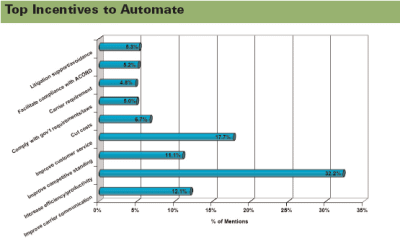Tides continue to turn on the automation frontier and agents and brokers riding the waves may be pushing a sea change in the way they communicate with insurance carriers, according to the results of a recent survey of independent agents and broker on their use of technology.
Insurance Journal and Kinetic Information LLC, revealed the single largest technological–and business–concern for agents and brokers today is their ability to work better with carriers and the way agencies communicate with their carriers may inhibit their agency’s business growth.
The study provided a close look at an industry in the early stages of what could be a very interesting technological transition. While we encountered a fairly sophisticated level of awareness of the possibilities offered by technology and a strong desire to take advantage of them, certain factors, including regulation and a complex relationship network with carriers, play a major role in determining how quickly and how extensively the industry can automate.
Why agencies automate?
Increasing efficiency and productivity were mentioned most often as respondents’ primary incentive to automate. Efficiency and productivity were mentioned nearly twice as often “improved customer service,” which placed second in the survey results.
Interestingly, however, improving communication with carriers scored higher in importance than any other factor. Rated in terms of importance, improved efficiency and productivity surprisingly ranked third, after carrier communications and improved competitive standing.
Respondents were also asked to specify barriers to automation and cost, predictably, was the most commonly cited barrier. Carrier interface problems followed closely behind cost. The lack of interoperability with existing systems, presumably agency management systems, was also a barrier to automation. Once again, however, when asked to rank barriers to automation in terms of importance, respondents singled out carrier interface problems over everything else.
Carrier interaction front-and-center
We conducted follow-up research to explore the issue of carrier interaction and the agents with whom we spoke expressed great enthusiasm for the subject, yet indicated a certain amount of frustration with it.
“The biggest problems,” said a representative of a large independent agency in Utah, “are related to quoting or policy changes. Having to go to so many different Web sites and keep track of so many different passwords and procedures creates a real training and administrative issue. It makes it difficult–in my opinion, unnecessarily difficult–for us to do our jobs.”
This opinion was echoed by an agent from upstate New York. “I think I was just canceled by a carrier because I was asking questions about the security of their downloads from the Internet.” On the other hand, this same agent said, “I work with seven carriers. Most of them want to know how they can work with us better, and some of them have changed the way they do business, and are really being agency-oriented.”
Technology in use
Agents and brokers use agency management software most often (91 percent), according to the study’s results, followed by backup and recovery (85.7 percent), an agency Web site (75.2 percent), electronic forms (73.7 percent), and document imaging (71.4 percent).
Agency management systems are the most important technology tool right now, said the respondents. Backup and recovery, electronic forms, business process management, workflow, and document management followed closely behind in terms of importance to agents and brokers who responded.
Respondents most often mentioned AMS and Applied Systems as the companies where they bought their existing technologies from. However, Dell Computers ranked third, which speaks to the broad way agents and brokers define “automation.” Doris, another known agency management system, ranked fourth.
Acquisition preferences and budget
Three-quarters of respondents said they prefer to acquire their automation in the form of a single integrated, comprehensive system that includes multiple technology types (imaging, workflow, etc.). Less than one-fifth said they prefer to connect and orchestrate separate solutions that address a particular need, and less than one in 10 said they prefer to utilize them on a hosted/subscription basis.
The reasons given for these preferences are remarkably similar, considering how much the three modes of acquisition differ, and boil down to issues of control, cost and manageability. The respondents made a fairly good case for each of the three options. Our sense from the qualitative research we have done is that the hosted/subscription option is gaining in traction, especially among smaller agencies, and over time will grab its share from the comprehensive-solution sector.
Respondents indicated that they plan to spend an average of about $72,000 on computer technology, however, estimates were all over the map, ranging from a high of $1 million to a low of $1,500. A better sense of their expectations may be found in the $50,000 figure that was cited most often, and the $25,000 that served as the median (middle score).
About the study
Insurance Journal partnered with Kinetic Information LLC late last year to conduct a wide-ranging survey of the technology usage patterns, needs, and concerns of insurance agencies and brokers across the United States.
The survey netted responses from agencies of all sizes, as measured by number of employees. The average was 24 employees per firm; two-thirds reported having between six and 50 employees.
Nearly two-thirds of the individuals responding (63 percent) identified themselves as CEO/principals; 11 percent were general managers, and 5.8 percent were IT types. Taken together, nearly three-quarters of respondents were principals or managers at their firms, and thus decision-makers in terms of technology investment and usage.
Conclusion
The essence of agency/broker attitudes toward technology is that the level of interest and use is high, but the term “automation” covers everything from simple scanners to sophisticated imaging and workflow solutions requiring specialized vendor attention.
If there is one thing that is clear, however, it is that agents and brokers will soon force a sea change in the way they communicate with their carriers, for they view the present technical limitations as inhibitors to their business growth, and they may not stand for it much longer.
Kinetic Information (www.kineticinfo.com) performs strategic business consulting for buyers and sellers of information technology. Founded in 1995 and located in Waltham, Mass., the firm is focused on technology’s ability to solve business problems, and provides practical analysis and high-value recommendations. For more information call (781) 893-4690.
Was this article valuable?
Here are more articles you may enjoy.




 Fla. Commissioner Offers Major Changes to Citizens’ Commercial Clearinghouse Plan
Fla. Commissioner Offers Major Changes to Citizens’ Commercial Clearinghouse Plan  Insurance Broker Stocks Sink as AI App Sparks Disruption Fears
Insurance Broker Stocks Sink as AI App Sparks Disruption Fears  Lemonade Books Q4 Net Loss of $21.7M as Customer Count Grows
Lemonade Books Q4 Net Loss of $21.7M as Customer Count Grows  Insurify Starts App With ChatGPT to Allow Consumers to Shop for Insurance
Insurify Starts App With ChatGPT to Allow Consumers to Shop for Insurance 


